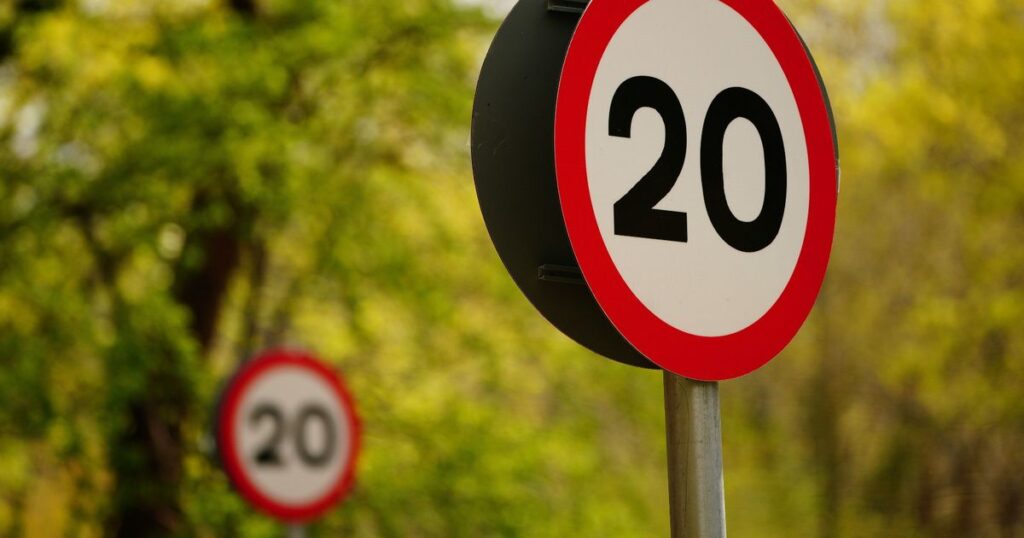A recent motion to reverse the 20mph speed limit in built-up areas of Wales has been overwhelmingly defeated in the Senedd. The vote, which concluded with 37 against and 14 in favour, marks a significant stance on road safety in the region.
Plaid Cymru and Labour members jointly rejected the Conservative proposal, emphasising the policy’s effectiveness in enhancing road safety. This decision reaffirms the commitment to retaining the lower speed limit despite widespread debate and public petitions.
Background of the 20mph Speed Limit
The 20mph speed limit was first introduced in Wales on 17 September 2023, making Wales the first country in the UK to reduce the default speed limit in built-up areas. This policy, aimed at improving road safety, has since been a subject of considerable public debate.
A petition against the 20mph speed limit garnered nearly 470,000 signatures, becoming the largest in Senedd history. Despite its controversy, the Welsh Government has consistently argued that the reduced speed limit is crucial for protecting lives and reducing casualties on the roads.
Government’s Position and Data Supporting the Policy
The Welsh Government has maintained that the 20mph speed limit is a vital road safety measure. According to their predictions, the new limit is expected to save up to 100 lives and reduce 20,000 casualties within the first decade. Additionally, the financial benefits include saving the NHS in Wales an estimated £92 million annually.
Lee Waters, the former transport minister, argued strongly for the policy, citing data that indicated a reduction in average speeds and collisions on roads. He noted that in the first six months, casualties decreased by 32%, making it the most effective road safety intervention since the COVID-19 lockdowns.
Challenges in Implementation and Public Perception
Despite the promising data, there have been challenges in implementing the policy effectively. Waters acknowledged that there were issues with how the policy was rolled out, suggesting that the government’s messaging undermined public compliance.
Waters expressed concerns that mixed public perception could influence the middle group of road users, who might otherwise adhere to the new speed limits. He emphasised the need for consistent and positive messaging to ensure continued compliance and prevent an increase in casualties.
Opposition’s Perspective
The Conservative party proposed the motion to revoke the 20mph speed limit, arguing that it negatively impacts the Welsh economy. Natasha Asghar, the Conservative shadow transport minister, claimed the policy could cost the economy up to £9 billion and described it as ‘draconian’.
Asghar also pointed out that the public sentiment towards the policy has not improved over time, with many still viewing it unfavourably. She highlighted that certain exemptions within the policy were not adequately communicated, leading to misunderstandings and discontent among the public.
Rebuttal of the Opposition’s Claims
In response to the Conservative’s arguments, government officials, including Lee Waters, accused the opposition of political opportunism. Waters highlighted that the data clearly showed a positive impact on road safety, with six fewer deaths reported in the first six months of the policy’s implementation.
Ken Skates, the new transport secretary, acknowledged that not all areas required the reduced speed limit due to specific local conditions. However, he supported the overarching policy, committing to reviewing and adjusting it where necessary to address legitimate concerns while preserving its core benefits.
Official Reprimand for Misleading Statements
During discussions, Natasha Asghar faced an official reprimand for her misleading statements on social media, where she inaccurately described Wales as having a ‘blanket’ 20mph speed limit. A committee of fellow MSs ruled that her communications brought the Senedd into disrepute due to their inaccuracy.
Asghar defended her use of the term ‘blanket’ as her opinion and stood by her position against the 20mph policy. Despite her defence, the unanimous censure underscored the importance of accurate public communication regarding legislative policies.
Future Outlook
As the debate continues, the Welsh Government remains firm in its stance on the 20mph speed limit, citing significant evidence of its benefits. The ongoing discourse suggests that while there might be adjustments, the policy is likely to remain a staple of Wales’s road safety strategy.
Future discussions are expected to focus on fine-tuning the implementation and addressing the specific areas where the reduced speed limit may not be as effective. The government’s commitment to data-driven policy-making will likely guide these adjustments.
The rejection of the proposal to revoke the 20mph speed limit in the Senedd highlights a strong commitment to road safety in Wales. The Welsh Government’s data-driven approach underscores the policy’s effectiveness in reducing casualties and saving lives.
As public discourse evolves, maintaining accurate communication and addressing specific concerns will be crucial for the continued success of the 20mph speed limit. With support from key government figures, the policy stands as a testament to prioritising public health and safety.

